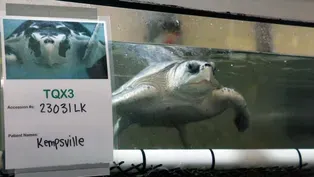
Shakeups looming for college football powerhouse conferences
Clip: 8/28/2023 | 5m 50sVideo has Closed Captions
A look at the major shakeups looming for college football's powerhouse conferences
The 2023 college football season is officially underway with some big changes looming. Starting next year, USC, UCLA, Oregon and Washington will move to the Big Ten while Arizona, Arizona State, Colorado and Utah will go to the Big 12, leaving just four schools in the PAC-12. Amna Nawaz discussed what these moves mean and what prompted them with Pat Forde of Sports Illustrated.
Major corporate funding for the PBS News Hour is provided by BDO, BNSF, Consumer Cellular, American Cruise Lines, and Raymond James. Funding for the PBS NewsHour Weekend is provided by...

Shakeups looming for college football powerhouse conferences
Clip: 8/28/2023 | 5m 50sVideo has Closed Captions
The 2023 college football season is officially underway with some big changes looming. Starting next year, USC, UCLA, Oregon and Washington will move to the Big Ten while Arizona, Arizona State, Colorado and Utah will go to the Big 12, leaving just four schools in the PAC-12. Amna Nawaz discussed what these moves mean and what prompted them with Pat Forde of Sports Illustrated.
How to Watch PBS News Hour
PBS News Hour is available to stream on pbs.org and the free PBS App, available on iPhone, Apple TV, Android TV, Android smartphones, Amazon Fire TV, Amazon Fire Tablet, Roku, Samsung Smart TV, and Vizio.
Providing Support for PBS.org
Learn Moreabout PBS online sponsorshipAMNA NAWAZ: The 2023 college football season is officially under way, with some big changes looming.
On Saturday, Heisman Trophy hopeful Caleb Williams threw four touchdowns, as his USC Trojans trounced San Jose State.
But that win kicked off the last season for USC in the Pac-12 Conference.
Starting next year, USC, UCLA, Oregon, and Washington will move to the Big Ten Conference, while Arizona, Arizona State, Colorado, and Utah will go to the Big 12, leaving just four schools in the Pac-12.
For more on what these moves mean and what prompted them, I'm joined now by Pat Forde, a senior writer for "Sports Illustrated."
Pat, good to see you.
Thanks for joining us.
PAT FORDE, "Sports Illustrated": Thank you.
Good to be with you.
AMNA NAWAZ: So, big picture, before we jump into the details here, just how substantial a realignment is this for college football?
PAT FORDE: It's massive.
I mean, the PAC 12 as a conference had been around for 108 years and had really been the cultural sports base for college athletics on the West Coast.
And now it is on the verge of being completely eradicated.
The movement is really unprecedented, in terms of what we have seen.
We are just making a mockery of geography and common sense and the travel demands on athletes here.
But it's all for the bottom line, TV dollars.
And that's what's driving everything.
AMNA NAWAZ: You called this in your latest column a sporting travesty, as you just mentioned.
You also wrote: "TV told the university presidents and athletic directors and conference commissioners to do it.
So, they did."
Is this really just all about the money?
PAT FORDE: It really is.
I mean, I'm not sure there's really any other way you can justify what's been going on.
TV rights revenues have just skyrocketed in terms of what schools can make from their media partners, whether it's ESPN for the Southeastern Conference and others or FOX Sports with the Big Ten.
They are in an arms race, really.
Those two leagues and the two networks are pitted against each other.
And the money is staggering.
And it is driving every decision from university presidents who may give lip service to academics.
But, clearly, the game they're playing is all about revenue.
AMNA NAWAZ: Let's just take a quick look at the map and show folks what we're talking about.
This is what the Big Ten will look like next year, literally teams competing from coast to coast.
Pat, this seems like a travel and logistical nightmare.
How is this going to work?
PAT FORDE: I don't know.
It's not going to work very well, I don't think.
What you're asking is athletes from Eugene, Oregon, Los Angeles, Seattle to get on planes constantly to fly two and three time zones to the East.
If you do enough coast-to-coast travel, you know that's very hard, but you're going to do that and play athletics and keep up with your studies at elite universities as well.
There's been lip service paid to increasing the number of charter flights and private aircraft, as opposed to putting them on commercial flights.
But we will see how much that actually happens.
There's been a lot of work put in to try to make these logistics work.
But unless they developed a time travel mechanism, it's just not going to be easy for anyone.
AMNA NAWAZ: So we are talking about football here, which is typically the big money sport at a lot of these schools.
But there are more than half-a-million student athletes competing in dozens of sports across the country in schools.
What's the impact on those teams and athletes?
PAT FORDE: That's where the impact will be bigger, because there's more midweek competition, especially like in basketball and some of the other sports, where, if you are going from West Coast to East Coast, or vice versa, you're missing two or three days of school for competition.
And, also, the -- just the budgets that are out there for these sports is not commensurate to what they're putting into football.
So if you're going to try to do this on the cheap, it's going to be really difficult to get your volleyball team, your swim team, your cross-country team to these competitions all over the country.
AMNA NAWAZ: We know ACC officials are meeting and considering adding two of the remaining Pac-12 teams to their conference.
That would be Stanford and University of California.
Are we just heading to a world where there's two or three big super conferences, and that's the way it is?
PAT FORDE: I think that's inevitably going to be the case.
The SEC and the Big Ten are so far ahead of everyone else.
The Big 12, the ACC are hanging on by their fingernails trying to remain viable.
This is part of that where the ACC is trying to get Stanford and California to help solidify their standing.
But, ultimately, I really do think that we are heading towards 24, 32, 40 schools playing big-time football, and everybody else has been kicked to the curb.
AMNA NAWAZ: In the minute or so I have left, we talked about the student athletes and the other -- other teams at these schools.
But what does all this mean for the fans?
PAT FORDE: Well, that's another thing for fans.
If you loved your in-state rivalry, if you're a Stanford fan, and you liked playing against USC, if you're Oregon State and your rival is Oregon, Washington State and Washington, those games are gone.
And so you're missing out on the chance to get in the car and drive over to the rival school and watch your team play, the chance to sit around the proverbial water cooler at the office and discuss with somebody that went to that school who's going to win the game this year.
There's no game.
And so there's not a whole lot of crossover between, say, Rutgers and Washington fans around the watercooler.
AMNA NAWAZ: Big changes coming to college football.
Pat Forde from "Sports Illustrated," thank you for walking us through those.
Good to see you.
PAT FORDE: Thank you.
Judge sets trial date for Trump's election interference case
Video has Closed Captions
Federal judge sets March trial date for Trump's federal election interference case (4m 38s)
Tamara Keith and Errin Haines on Trump's trial date
Video has Closed Captions
Tamara Keith and Errin Haines on Trump's trial date and who's seeing a post-debate bounce (9m 54s)
What's next for Russia in Africa after Prigozhin death
Video has Closed Captions
What's next for Russia and Wagner Group in Africa following death of Prigozhin (9m 43s)
Where race issues stand 60 years after March on Washington
Video has Closed Captions
Where issues of race and activism stand 60 years after March on Washington (9m 54s)
Why some lawmakers want to reform the Endangered Species Act
Video has Closed Captions
Why some lawmakers want to reform the Endangered Species Act (7m 16s)
Providing Support for PBS.org
Learn Moreabout PBS online sponsorshipMajor corporate funding for the PBS News Hour is provided by BDO, BNSF, Consumer Cellular, American Cruise Lines, and Raymond James. Funding for the PBS NewsHour Weekend is provided by...

















